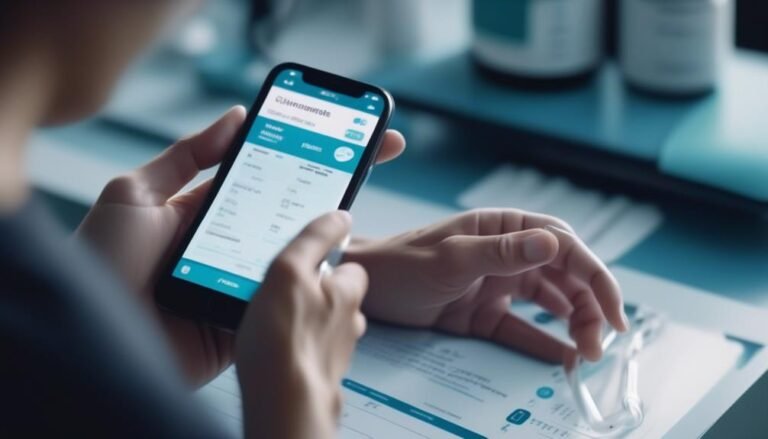Empowering Patients Through Education and Involvement in Care Decisions
In today's healthcare landscape, the concept of patient empowerment through education and involvement in care decisions has gained significant attention. As healthcare providers, we are constantly seeking ways to enhance patient outcomes and satisfaction. By placing a greater emphasis on educating and involving patients in their care decisions, we have the potential to positively impact the overall quality of care.
This shift in approach not only benefits patients but also holds the promise of improving the efficiency and effectiveness of healthcare delivery. The question remains: How can patient empowerment through education and involvement in care decisions be effectively integrated into the healthcare system to maximize its potential impact?
Key Takeaways
- Patient empowerment and involvement in care decisions leads to improved health outcomes and treatment adherence.
- Clear and jargon-free communication, active listening, and providing clear explanations are important strategies for facilitating patient education and involvement.
- Informed choices and shared decision making promote patient empowerment and enhance the quality of care.
- Patient education and involvement can be facilitated through various tools and resources, but challenges such as limited health literacy and time constraints need to be addressed.
The Importance of Patient Empowerment
The concept of patient empowerment is crucial in modern healthcare. It not only fosters a sense of autonomy and control but also leads to improved health outcomes and satisfaction with care.
Patient autonomy, the ability for individuals to make informed decisions about their own health, is at the core of patient empowerment. This empowerment is further enhanced through shared decision making.
Shared decision making involves healthcare providers and patients collaborating to make decisions about treatment plans. These decisions are based on the patient's values, preferences, and clinical expertise.
By involving patients in the decision-making process, healthcare providers can ensure that the treatment plans align with the patient's goals and desires. This leads to a greater sense of control and satisfaction for the patient.
Additionally, patient empowerment has been shown to improve health outcomes. When patients are actively involved in their own care, they are more likely to adhere to treatment plans and engage in healthy behaviors.
Benefits of Patient Education and Involvement
Education and active involvement of patients in their healthcare decisions are pivotal factors in promoting positive health outcomes and enhancing patient satisfaction. When patients are engaged and informed about their health, they are better equipped to make decisions that align with their values and preferences.
The benefits of patient education and involvement are substantial:
- Improved Health Outcomes
Patients who are well-informed about their conditions and treatment options are more likely to adhere to their care plans, leading to better health outcomes and reduced healthcare utilization.
- Enhanced Patient Satisfaction
Shared decision making fosters a sense of empowerment and trust between patients and healthcare providers, resulting in higher levels of patient satisfaction and improved overall experience.
Patient engagement and shared decision making have been linked to increased treatment adherence, better management of chronic conditions, and reduced healthcare disparities. By actively involving patients in their care and providing them with the necessary education, healthcare providers can empower individuals to take control of their health and well-being, ultimately leading to improved outcomes and a more satisfying healthcare experience.
Strategies for Healthcare Provider Facilitation
In delivering patient-centered care, healthcare providers employ various strategies to facilitate informed decision making and active participation from patients in their treatment plans.
Effective healthcare communication is essential for provider-patient collaboration. Healthcare providers can facilitate informed decision making by ensuring clear, jargon-free communication with patients. This involves actively listening to patients, asking open-ended questions, and providing clear explanations about diagnoses, treatment options, and potential outcomes. Additionally, healthcare providers can employ shared decision-making tools, such as decision aids or informational pamphlets, to help patients understand their conditions and make informed choices about their care.
Patient engagement can be enhanced through strategies such as encouraging questions and active participation during medical appointments. Providers can also promote patient engagement by involving patients in care planning and goal setting, ensuring that their individual preferences and values are taken into account. Furthermore, utilizing technology, such as patient portals and telehealth platforms, can facilitate ongoing communication and engagement between patients and healthcare providers, empowering patients to take an active role in managing their health.
Ultimately, these strategies aim to foster a collaborative and supportive healthcare environment, where patients feel empowered to make informed decisions about their care.
Impact on Health Outcomes and Satisfaction
Enhancing patient empowerment in care decisions has been shown to correlate positively with improved health outcomes and increased satisfaction with the healthcare experience. When patients are actively engaged in their care decisions, they are more likely to adhere to their treatment plans and take an active role in managing their health.
This increased level of patient engagement has several significant effects on health outcomes and satisfaction:
- Improved Health Outcomes
- Enhanced treatment adherence: Patients who are empowered to participate in their care decisions are more likely to adhere to their treatment plans, leading to better health outcomes.
- Proactive management of health: Empowered patients are more likely to take proactive measures to manage their health, leading to better overall outcomes and a reduced risk of complications.
- Increased Satisfaction
- Enhanced trust in healthcare providers: Patient empowerment fosters a collaborative relationship between patients and healthcare providers, leading to increased trust and satisfaction with the care received.
- Improved overall experience: Patients who are actively involved in their care decisions tend to feel more satisfied with their healthcare experience, leading to higher overall satisfaction and a sense of control over their health.
Empowering patients through education and involvement in care decisions is essential for improving health outcomes and fostering greater satisfaction with the healthcare experience.
Promoting Informed Choices for Patient Health
Patient empowerment in care decisions has a direct impact on promoting informed choices for patient health, leading to better treatment adherence and proactive health management. Informed consent and shared decision-making play pivotal roles in ensuring that patients are well-informed and actively involved in their healthcare journey.
Informed consent is a fundamental aspect of promoting informed choices. It involves providing patients with comprehensive information about their diagnosis, treatment options, potential risks, and benefits. This empowers patients to make decisions that align with their values, preferences, and personal goals. It also fosters a sense of trust and collaboration between patients and healthcare providers, thereby enhancing the overall quality of care.
Furthermore, shared decision-making involves a collaborative partnership between patients and healthcare professionals. It acknowledges the expertise of both parties, with the patient contributing their knowledge of their own experiences and preferences, and the healthcare provider offering medical expertise. Through this approach, patients are actively engaged in choosing the most suitable treatment options, leading to greater satisfaction with the chosen care plan and improved health outcomes.
Conclusion
In conclusion, the empowerment of patients through education and involvement in care decisions is crucial for improving health outcomes and satisfaction. By promoting informed choices and facilitating strategies for healthcare providers, patients can take an active role in their own healthcare.
This approach fosters a sense of control and autonomy, ultimately leading to a more positive and fulfilling healthcare experience.
It's time to shift the paradigm and give patients the knowledge and power they deserve in their healthcare journey.







